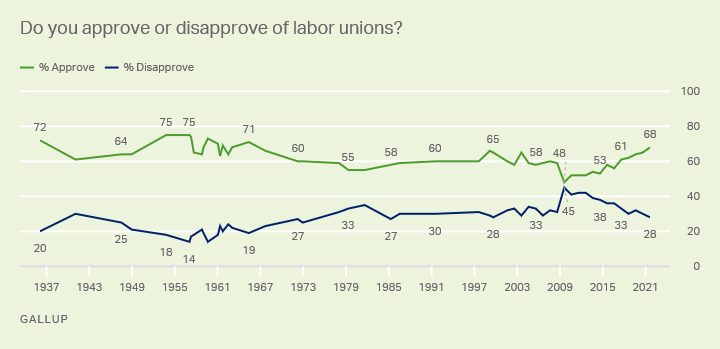Table of Contents
Trade Unions
(Topics: Private Sector | Back to Home)
Here's one particularly strange part about how Americans understand business: people working together to advance a shared goal is a good thing or a bad thing, depending on what you call that group of people.
It's not even about the goal, because in business all goals are the same: negotiating a fair exchange between buyers and sellers. And that is what both companies and unions do. They are both groups of people working together to advance a shared goal, which is to negotiate a fair deal between buyers and sellers.
But that's not how we feel about unions and management. Depending on whether you lean Team Blue or Team Red, you likely think one group-of-people-with-shared-goals-to-negotiate-fairness are generally good, and the other is generally bad.
Why is that?
A Bit of Backstory
I think the best way to understand almost anything is through the lens of history. A few hundred years ago, in the middle of the 1700s, the economy in Europe and the Americas began changing rapidly. More workers began relocating to cities. Skilled workers with training in various crafts began working in larger operations. If you were a cooper (who made barrels), a cobbler (who made shoes), or wheelwright (who made wheels), there was a reasonable chance that you would be employed in the forerunner of the modern factory.
This was the early days of capitalism. Pool together resources, figure out how to scale, and thus increase profits. And all of it happened extremely quickly. Within a century, the population shifted from being mostly rural to mostly urban [1]. And that meant that people who had the same kinds of jobs were all connected together—in the same communities—and began to organize and coordinate.
The first union was formed in the United States in 1794 [2] mainly to protect wages and ensure product quality. Within a decade, trade organizations were effectively declared illegal via a landmark trial decision [3]. It wasn't until 1844 that another court a provided a contrary ruling [4]. The right to organize was formally codified into law in 1926 Railway Labor Act, which was successful precisely because it was not especially radical [5].
That bill was signed into law by famously small-government conservative Calvin Coolidge. And labor unions got another boost from a Republican in 1952, when Dwight Eisenhower praised their work during the war and acknowledge how much conditions had improved since his pre-Army days working in a dairy factory [6].
Popular support for unions was high. So was membership in unions. But this began to change in the 1970s and 1980s, correlating with the decline of union-heavy industries like manufacturing. And perhaps the turning point was on August 5, 1981. On this day, President Ronald Reagan made the decision to respond to a labor strike by firing eleven thousand air traffic controllers. Steadily, the Republicans became the anti-union party. And because the teams must take different sides, the Democrats remained the pro-union party [7]. (And of course, both parties are quietly pro-business parties.)
The Graphs That Make No Sense
If you're still here, you know the narrative: labor unions fought for workers rights, and were generally supported by politicians—up until the 1970s and beyond. Today, one half of the country thinks unions are essential to a functioning economy, and the other thinks they are ruining the economy.
But that's not what the data says. Instead apparently we mostly approve of unions, but almost none of them are in them any longer:


Which brings us to the point, and much of the reason I am running for office: we aren't hearing the truth. What politicians are telling us that we believe isn't actually what we believe.
And if they aren't being honest with us, then why should we trust any of them?
Which, interestingly, sounds a lot like the dispute that has always happened when labor and management get too far apart. The truth matters, and in the absence of truth we have chaos.
[1] Particularly in the UK, but more and more in the United States at the same time.
[2] https://philadelphiaencyclopedia.org/archive/cordwainers-trial-of-1806/
[3] https://www.encyclopedia.com/law/law-magazines/philadelphia-cordwainers-trial-1806
[4] https://www.britannica.com/event/Commonwealth-v-Hunt
[5] https://www.cato.org/sites/cato.org/files/serials/files/regulation/1992/10/reg15n4r.html
[6] https://timesmachine.nytimes.com/timesmachine/1952/09/18/84356361.pdf?pdf_redirect=true&ip=0
[7] Except, members of both parties largely approve of unions. So this isn't really true.